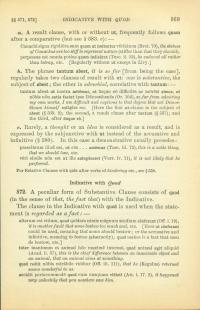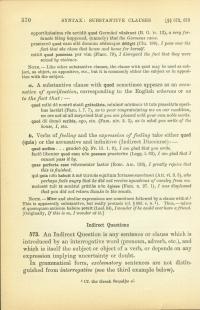572. A peculiar form of substantive clause consists of quod (in the sense of that, the fact that) with the indicative. The clause in the indicative with quod is used when the statement is regarded as a fact.
alterum est vitium, quod quīdam nimis māgnum studium cōnferunt, etc. (Off. 1.19)
It is another fault that some bestow too much zeal, etc.
Here ut cōnferant could be used, meaning that some should bestow; or the accusative and infinitive, meaning to bestow (abstractly); quod makes it a fact that men do bestow, etc.
Inter inanimum et animal hōc maximē interest, quod animal agit aliquid. (Acad. 2.37)
This is the chief difference between an inanimate object and an animal, that an animal aims at something.
Quod rediit nōbīs mīrābile vidētur. (Off. 3.111)
That he (Regulus) returned seems wonderful to us.
Accidit perincommodē quod eum nusquam vīdistī. (Att. 1.17.2)
It happened very unluckily that you nowhere saw him.
Opportūnissima rēs accidit quod Germānī vēnērunt. (B. G. 4.13)
A very fortunate thing happened, (namely) that the Germans came.
Praetereō quod eam sibi domum sēdemque dēlēgit. (Clu. 188)
I pass over the fact that she chose that house and home for herself.
Mittō quod possessa per vim. (Flacc. 79)
I disregard the fact that they were seized by violence.
Note— Like other substantive clauses, the clause with quod may be used as subject, as object, as appositive, etc., but it is commonly either the subject or in apposition with the subject.
a. A substantive clause with quod sometimes appears as an Accusative of Specification, corresponding to the English whereas or as to the fact that.
Quod mihi dē nostrō statū grātulāris, minimē mīrāmur tē tuīs praeclārīs operibus laetārī. (Fam. 1.7.7)
As to your congratulating me on our condition, we are not at all surprised that you are pleased with your own noble works.
Quod dē domō scrībis, ego, etc. (Fam. 14.2.3)
As to what you write of the house, I, etc.
b. Verbs of feeling and the expression of feeling take either quod (quia) or the accusative and infinitive (indirect discourse).
Quod scrībis . . . gaudeō. (Q. Fr. 3.1.9)
I am glad that you write.
Faciō libenter quod eam nōn possum praeterīre. (Legg. 1.63)
I am glad that I cannot pass it by.
Quae perfecta esse vehementer laetor. (Rosc. Am. 136)
I greatly rejoice that this is finished.
quī quia nōn habuit ā mē turmās equitum fortasse suscēnset (Att. 6.3.5)
who perhaps feels angry that he did not receive squadrons of cavalry from me.
Molestē tulī tē senātuī grātiās nōn ēgisse. (Fam. 10.27.1)
I was displeased that you did not return thanks to the senate.
Note— īror and similar expressions are sometimes followed by a clause with sī.1 This is apparently substantive, but really protasis (cf. § 563.e, Note 1).
Mīror sī quemquam amīcum habēre potuit. (Lael. 54)
I wonder if he could ever have a friend.
[Originally, If this is so, I wonder at it.]


